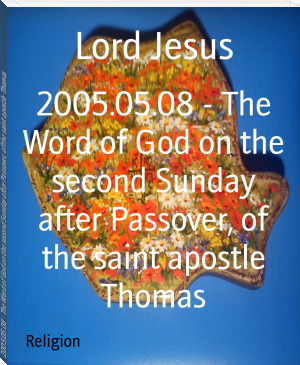The Story of a Soul - Saint Thérèse de Lisieux (best color ereader .TXT) 📗

- Author: Saint Thérèse de Lisieux
- Performer: -
Book online «The Story of a Soul - Saint Thérèse de Lisieux (best color ereader .TXT) 📗». Author Saint Thérèse de Lisieux
Thus in many pretty ways she hid her mortifications. One fast-day, however, when our Reverend Mother ordered her some special food, I found her seasoning it with wormwood because it was too much to her taste. On another occasion I saw her drinking very slowly a most unpleasant medicine. "Make haste," I said, "drink it off at once!" "Oh, no!" she answered; "must I not profit of these small opportunities for penance since the greater ones are forbidden me?"
Toward the end of her life I learned that, during her noviciate, one of our Sisters, when fastening the scapular for her, ran the large pin through her shoulder, and for hours she bore the pain with joy. On another occasion she gave me proof of her interior mortification. I had received a most interesting letter which was read aloud at recreation, during her absence. In the evening she expressed the wish to read it, and I gave it to her. Later on, when she returned it, I begged her to tell me what she thought of one of the points of the letter which I knew ought to have charmed her. She seemed rather confused, and after a pause she answered: "God asked of me the sacrifice of this letter because of the eagerness I displayed the other day . . . so I have not read it."
* * * * * *
When speaking to her of the mortifications of the Saints, she remarked: "It was well that Our Lord warned us: 'In My Father's House there are many mansions, otherwise I would have told you.'[9] For, if every soul called to perfection were obliged to perform these austerities in order to enter Heaven, He would have told us, and we should have willingly undertaken them. But He has declared that, 'there are many mansions in His House.' If there are some for great souls, for the Fathers of the Desert and for Martyrs of penance, there must also be one for little children. And in that one a place is kept for us, if we but love Him dearly together with Our Father and the Spirit of Love."
* * * * * *
"While in the world, I used, on waking, to think of all the pleasant or unpleasant things which might happen throughout the day, and if I foresaw nothing but worries I got up with a heavy heart. Now it is quite the reverse. I think of the pains and of the sufferings awaiting me, and I rise, feeling all the more courageous and light of heart in proportion to the opportunities I foresee of proving my love for Our Lord, and of gaining—mother of souls as I am—my children's livelihood. Then I kiss my crucifix, and, laying it gently on my pillow, I leave it there while I dress, and I say: 'My Jesus, Thou hast toiled and wept enough during Thy three-and-thirty years on this miserable earth. Rest Thee, to-day! It is my turn to suffer and to fight.'"
* * * * * *
One washing-day I was sauntering towards the laundry, and looking at the flowers as I passed. Soeur Thérèse was following, and quickly overtook me: "Is that," she said quietly, "how people hurry themselves when they have children, and are obliged to work to procure them food?"
* * * * * *
"Do you know which are my Sundays and feast-days? They are the days on which God tries me the most."
* * * * * *
I was distressed at my want of courage, and Soeur Thérèse said to me: "You are complaining of what should be your greatest happiness. If you fought only when you felt eagerness, where would be your merit? What does it matter, even if you are devoid of courage, provided you act as though you possessed it? If you feel too lazy to pick up a bit of thread, and yet do so for love of Jesus, you acquire more merit than for a much nobler action done in a moment of fervour. Instead of grieving, be glad that, by allowing you to feel your own weakness, Our Lord is furnishing you with an opportunity of saving a greater number of souls."
* * * * * *
I asked her whether Our Lord were not displeased at the sight of my many failings. This was her answer: "Be comforted, for He Whom you have chosen as your Spouse has every imaginable perfection; but—dare I say it?—He has one great infirmity too—He is blind! And there is a science about which He knows nothing—addition! These two great defects, much to be deplored in an earthly bridegroom, do but make ours infinitely more lovable. Were it necessary that He should be clear-sighted, and familiar with the science of figures, do you not think that, confronted with our many sins, He would send us back to our nothingness? But His Love for us makes him actually blind.
"If the greatest sinner on earth should repent at the moment of his death, and draw His last breath in an act of love, neither the many graces he had abused, nor the multiplied crimes he had committed, would stand in his way. Our Lord would see nothing, count nothing, but the sinner's last prayer, and without delay He would receive him into the arms of His Mercy.
"But, to make Him thus blind and to prevent Him doing the smallest sum of addition, we must approach Him through His Heart—on that side He is vulnerable and defenceless."
* * * * * *
I had grieved her, and had gone to ask her pardon: "If you but knew what I feel!" she exclaimed. "Never have I more clearly understood the love with which Jesus receives us when we seek His forgiveness. If I, His poor little creature, feel so tenderly towards you when you come back to me, what must pass through Our Lord's Divine Heart when we return to Him? Far more quickly than I have just done will He blot out our sins from His memory. . . . Nay, He will even love us more tenderly than before we fell."
* * * * * *
I had an immense dread of the judgments of God, and no argument of Soeur Thérèse could remove it. One day I put to her the following objection: "It is often said to us that in God's sight the angels themselves are not pure. How, therefore, can you expect me to be otherwise than filled with fear?"
She replied: "There is but one means of compelling God not to judge us, and it is—to appear before Him empty-handed." "And how can that be done?" "It is quite simple: lay nothing by, spend your treasures as you gain them. Were I to live to be eighty, I should always be poor, because I cannot economise. All my earnings are immediately spent on the ransom of souls.
"Were I to await the hour of death to offer my trifling coins for valuation, Our Lord would not fail to discover in them some base metal, and they would certainly have to be refined in Purgatory. Is it not recorded of certain great Saints that, on appearing before the Tribunal of God, their hands laden with merit, they have yet been sent to that place of expiation, because in God's Eyes all our justice is unclean?"
"But," I replied, "if God does not judge our good actions, He will judge our bad ones." "Do not say that! Our Lord is Justice itself, and if He does not judge our good actions, neither will He judge our bad ones. It seems to me, that for Victims of Love there will be no judgment. God will rather hasten to reward with eternal delights His own Love which He will behold burning in their hearts."
"To enjoy such a privilege, would it suffice to repeat that Act of Oblation which you have composed?" "Oh, no! words do not suffice. To be a true Victim of Love we must surrender ourselves entirely. . . . Love will consume us only in the measure of our self-surrender."
* * * * * *
I was grieving bitterly over a fault I had committed. "Take your
Crucifix," she said, "and kiss it." I kissed the Feet.
"Is that how a child kisses its father? Throw your arms at once round His Neck and kiss His Face." When I had done so, she continued: "That is not sufficient—He must return your caress." I had to press the Crucifix to both my cheeks, whereupon she added: "Now, all is forgiven."
* * * * * *
I told her one day that if I must be reproached I preferred deserving it to being unjustly accused. "For my part," she replied, "I prefer to be charged unjustly, because, having nothing to reproach myself with, I offer gladly this little injustice to God. Then, humbling myself, I think how easily I might have deserved the reproach. The more you advance, the fewer the combats; or rather, the more easy the victory, because the good side of things will be more visible. Then your soul will soar above creatures. As for me, I feel utterly indifferent to all accusations because I have learned the hollowness of human judgment."
She added further: "When misunderstood and judged unfavourably, what benefit do we derive from defending ourselves? Leave things as they are, and say nothing. It is so sweet to allow ourselves to be judged anyhow, rightly or wrongly.
"It is not written in the Gospel that Saint Mary Magdalen put forth excuses when charged by her sister with sitting idle at Our Lord's Feet. She did not say: 'Martha, if you knew the happiness that is mine and if you heard the words that I hear, you too would leave everything to share my joy and my repose.' No, she preferred to keep silent. . . . Blessed silence which giveth such peace to the soul!"
* * * * * *
At a moment of temptation and struggle I received this note: "'The just man shall correct me in mercy and shall reprove me; but let not the oil of the sinner perfume my head.'[10] It is only by the just that I can be either reproved or corrected, because all my Sisters are pleasing to God. It is less bitter to be rebuked by a sinner than by a just man; but through compassion for sinners, to obtain their conversion, I beseech Thee, O my God, to permit that I may be well rebuked by those just souls who surround me. I ask also that the oil of praise, so sweet to our nature, may not perfume my head, that is to say, my mind, by making me believe that I possess virtues when I have merely performed a few good actions.
"Jesus! 'Thy Name is as oil poured out,'[11] and it is into this divine perfume that I desire wholly to plunge myself, far from the gaze of mankind."
* * * * * *
"It is not playing the game to argue with a Sister that she is in the wrong, even when it is true, because we are not answerable for her conduct. We must not be Justices of the peace, but Angels of peace only."
* * * * * *
"You give yourselves up too much to what you are doing," she used to say to us; "you worry about the future as though it were in your hands. Are you much concerned at this moment as to what is happening in other Carmelite convents, and whether the nuns there are busy or otherwise? Does their work prevent you praying or meditating? Well, just in the same way, you ought to detach yourselves





Comments (0)